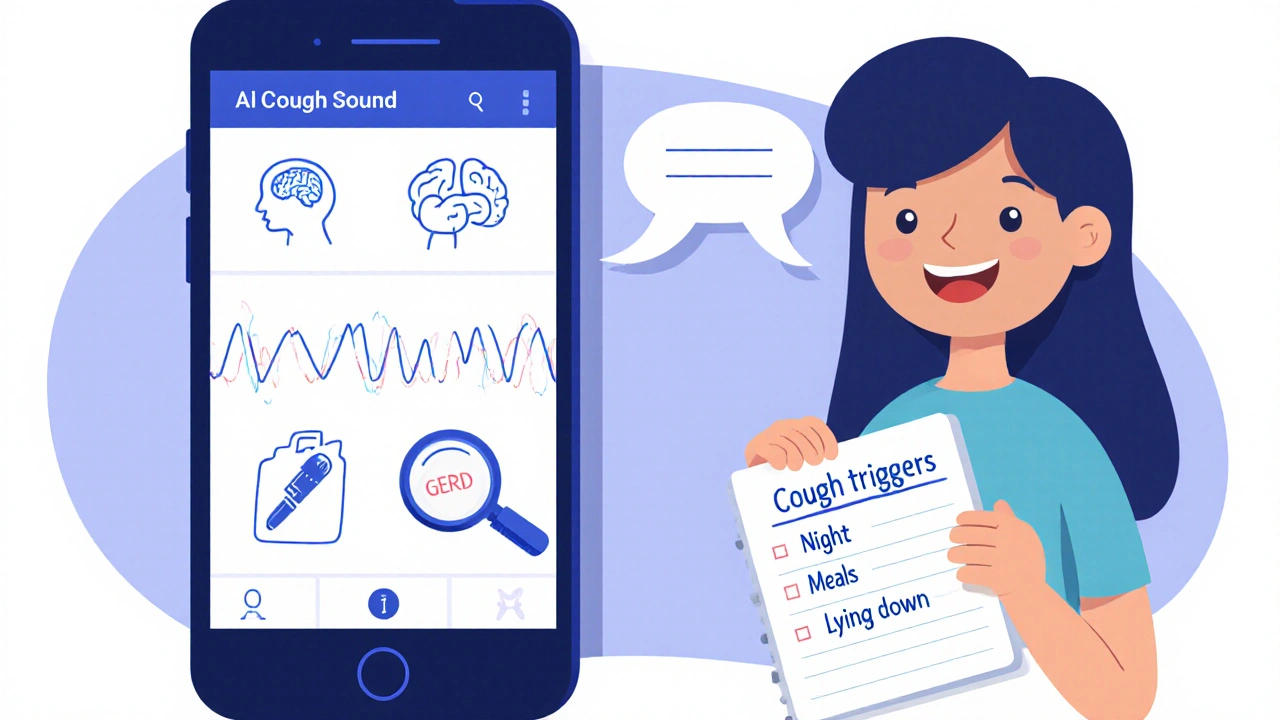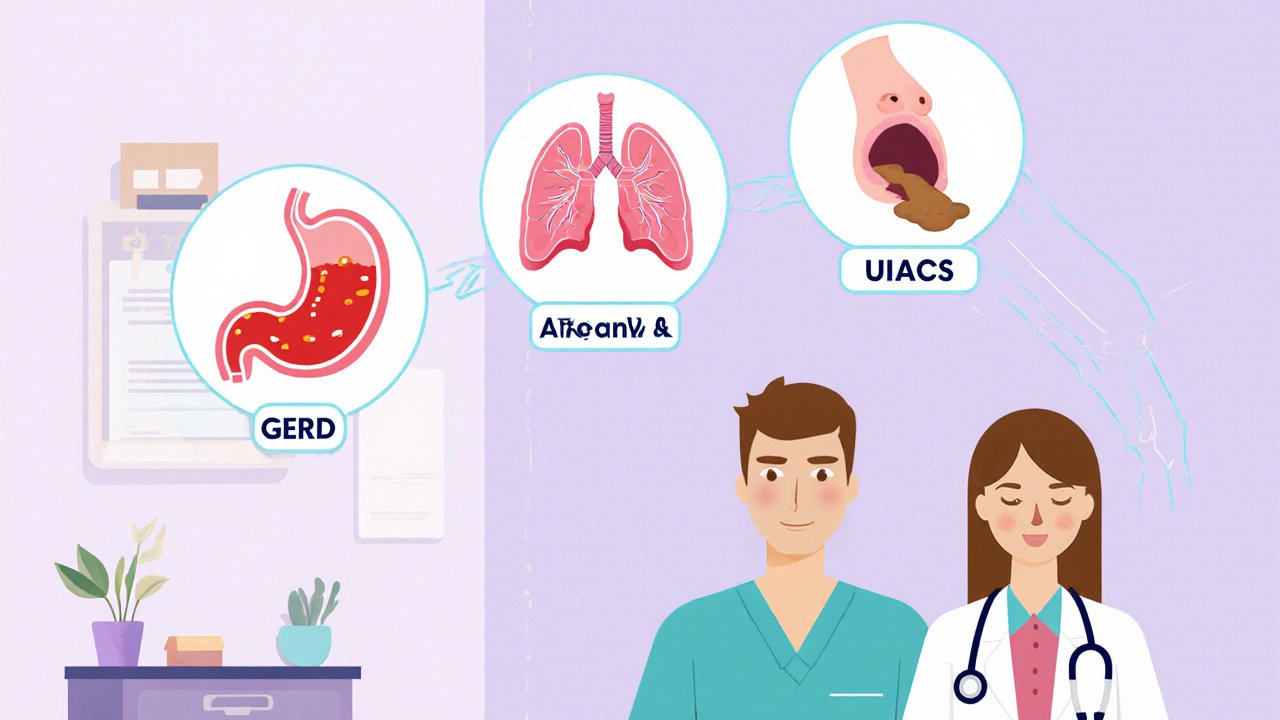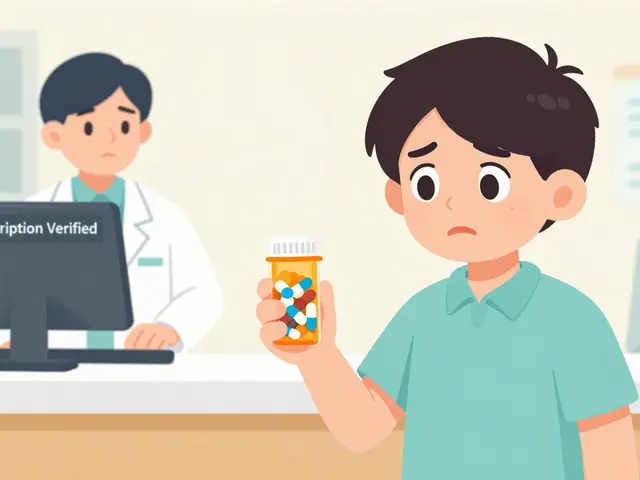If you’ve had a cough that won’t go away for more than eight weeks, you’re not alone. About 1 in 10 adults deal with this frustrating symptom, and most of the time, it’s not caused by a cold or infection. In fact, the real culprits are often three quiet, overlooked conditions: GERD, asthma, and upper airway cough syndrome (formerly called postnasal drip). These three make up 80 to 95% of all chronic cough cases in people who don’t smoke or take certain blood pressure meds. The good news? You don’t need a dozen tests to find out what’s causing it. You need a smart, step-by-step approach.
Start by Ruling Out the Dangerous Stuff
Before you even think about GERD or asthma, you need to make sure nothing serious is going on. A chronic cough can sometimes be a sign of lung cancer, tuberculosis, or heart failure - but these are rare. Look for red flags: coughing up blood, unexplained weight loss, fever that won’t quit, or swelling in your legs. If any of these are present, you need imaging and specialist care right away. But if you’re otherwise healthy, your doctor will start with a simple chest X-ray. It’s not glamorous, but it rules out big problems like tumors or long-term infections. Most people with chronic cough have a normal X-ray - and that’s actually helpful. It means you’re likely dealing with one of the three common causes.Check Your Medications
One of the most common - and easily missed - causes of chronic cough is a medication you might be taking without thinking twice about it: ACE inhibitors. These are blood pressure drugs like lisinopril or enalapril. About 5 to 35% of people who take them develop a dry, tickly cough within days or months of starting. It’s not an allergy. It’s a direct side effect. If you’re on one of these and have had a cough for weeks, talk to your doctor about switching to a different type of blood pressure medicine. Often, the cough clears up within a week or two after stopping it. Don’t stop the drug yourself - but do bring it up at your next visit.The Big Three: What to Test For
Once the scary stuff is ruled out, the focus shifts to the three most common causes. The order matters. You don’t test them all at once. You try one, wait, and see if it helps - then move to the next.1. Upper Airway Cough Syndrome (UACS) - The #1 Cause
UACS, which used to be called postnasal drip, is responsible for 38 to 62% of chronic cough cases. It’s not just mucus dripping down your throat - it’s a hypersensitive cough reflex triggered by irritation in your nose and throat. You might feel like you’re clearing your throat all day, or you have a lump in your throat. But here’s the twist: you might not even notice nasal congestion. That’s why so many people miss it. The test? A therapeutic trial. Take a first-generation antihistamine like diphenhydramine (Benadryl) plus a decongestant like pseudoephedrine for 2 to 3 weeks. No fancy scans. No blood tests. Just the medicine. If your cough improves by 50% or more, UACS is likely the cause. Response rates are high - 70 to 90% of people with true UACS get better. If it doesn’t help, move on.2. Asthma - Especially Cough Variant Asthma
Asthma doesn’t always mean wheezing. In fact, about 24 to 29% of adults with chronic cough have what’s called cough variant asthma - where the only symptom is a cough. It often gets worse at night, after exercise, or when you’re exposed to cold air or allergens. You might not feel short of breath, but your airways are still inflamed and overly reactive. The first step is spirometry - a simple breathing test that measures how much air you can blow out and how fast. If it’s normal, that doesn’t rule out asthma. Next, your doctor might do a methacholine challenge test. This involves breathing in a mist that slightly irritates your airways. If your lung function drops by 12% or more, you have hyperreactive airways - a sign of asthma. Alternatively, your doctor might skip the test and just try an inhaled corticosteroid (like fluticasone) for 4 to 6 weeks. If your cough improves, asthma is likely the cause. About 60 to 80% of people with cough variant asthma respond to this treatment.3. GERD - The Silent Trigger
GERD is the trickiest of the three. Only about half of people with GERD-related cough have heartburn. The rest have what’s called “silent reflux” - stomach acid creeping up into the throat and irritating the nerves that trigger coughing. You might wake up with a sore throat, feel like food is stuck in your chest, or have a bitter taste in your mouth in the morning. The old way was to just start you on a high-dose proton pump inhibitor (PPI) like omeprazole twice a day for 8 weeks. But here’s the problem: 35 to 40% of people get better on a placebo - meaning the improvement isn’t always from the medicine. Newer guidelines now say: don’t just guess. Use the Hull Airway Reflux Questionnaire (HARQ). If your score is above 13, you’re very likely to have laryngopharyngeal reflux. Even then, a 4- to 8-week trial of PPI is still the standard. If your cough improves, it’s likely GERD. But if it doesn’t? Don’t keep taking it. You’re not helping yourself.
Why the Trial-and-Error Approach Works
You might be wondering: why not just run all the tests at once? Because it’s expensive, unnecessary, and often misleading. A 24-hour pH monitor (which tracks stomach acid) only shows abnormalities in 50 to 70% of people with GERD-related cough. A chest CT scan gives you no extra benefit if your X-ray is normal - and exposes you to radiation equivalent to 74 chest X-rays. The sequential trial approach - treating one condition at a time - has been proven in multiple studies to be just as accurate, and far more cost-effective. Each trial takes time. UACS? 1 to 2 weeks to see results. Asthma? 2 to 4 weeks. GERD? 4 to 8 weeks. That’s why patience matters. If you quit too soon, you’ll think the treatment didn’t work - when it just needed more time.What If Nothing Works?
About 10 to 30% of people don’t respond to any of the three main treatments. That’s when you dig deeper. Other possible causes include:- Chronic bronchitis (especially if you’re a former smoker)
- Pertussis (whooping cough) - rare in adults, but possible if you haven’t had a booster
- Chronic aspiration - when food or liquid goes into the lungs
- Chronic refractory cough (CRC) - a condition where the cough reflex becomes oversensitive, with no clear trigger

What You Can Do Today
You don’t need to wait for a specialist to start making progress. Here’s what you can do right now:- Write down when your cough happens - at night? After meals? When you lie down? This helps your doctor spot patterns.
- Stop taking any ACE inhibitor blood pressure meds - but only after talking to your doctor.
- Try a simple antihistamine + decongestant for 10 days (like Claritin-D or Benadryl-D). If it helps, UACS is likely.
- Avoid eating 3 hours before bed, cut out caffeine and spicy foods, and elevate your head while sleeping. These help even if GERD isn’t confirmed.
- Don’t use cough suppressants long-term. They mask the symptom but don’t fix the cause.
What’s Changing in 2025
The field is shifting fast. Doctors are moving away from the term “postnasal drip” because it’s misleading. The real issue isn’t mucus - it’s nerve sensitivity. That’s why “upper airway cough syndrome” is now the preferred term. Also, AI is starting to help. A 2023 study showed that software can analyze cough sounds and tell the difference between asthma and GERD with 87% accuracy. In the next few years, you might be able to record your cough on your phone and get a preliminary clue - before even seeing a doctor.Final Thoughts
Chronic cough isn’t something you just have to live with. It’s a signal - and with the right approach, it can be silenced. Most people get better within weeks using simple, low-cost methods. The key is not to rush into expensive tests. It’s to follow the evidence: rule out the dangerous stuff, check your meds, and try the big three in order. If you’ve been told your cough is “just allergies” or “nothing serious,” ask for a structured workup. You deserve answers - and relief.Can GERD cause a cough without heartburn?
Yes. About half of people with GERD-related cough don’t have typical heartburn. This is called silent reflux. The acid irritates the throat and vocal cords, triggering a cough reflex without causing burning in the chest. Symptoms may include a lump sensation in the throat, frequent throat clearing, or a sour taste in the morning.
Is a chest X-ray necessary for chronic cough?
Yes, it’s the first imaging test recommended. A normal chest X-ray rules out serious conditions like lung cancer, tuberculosis, or bronchiectasis. If the X-ray is normal, further imaging like a CT scan is usually unnecessary and exposes you to unnecessary radiation. The American College of Radiology advises against routine CT scans for chronic cough unless red flags are present.
Can asthma cause a cough without wheezing?
Yes. This is called cough variant asthma. In this form, the only symptom is a persistent cough, often worse at night or after exercise. Spirometry may be normal, but a methacholine challenge test or a trial of inhaled steroids can confirm the diagnosis. Many people with this condition are misdiagnosed with allergies or bronchitis.
How long should I try a medication before deciding it doesn’t work?
For upper airway cough syndrome, give antihistamines and decongestants 1 to 2 weeks. For asthma, give inhaled steroids 2 to 4 weeks. For GERD, give proton pump inhibitors 4 to 8 weeks. Rushing the trial leads to false negatives. Improvement is often gradual, and symptoms may return if you stop too early.
Why do some doctors prescribe antibiotics for chronic cough?
It’s a common mistake. Only 1 to 5% of chronic cough cases in adults are caused by bacterial infections like pertussis. Antibiotics won’t help if the cause is asthma, GERD, or UACS. Overuse leads to resistance and side effects. The correct test for pertussis is a nasal swab with special culture media - not a broad-spectrum antibiotic.
Are over-the-counter cough medicines effective?
Not for chronic cough. Most OTC cough syrups target acute coughs from colds. They don’t address the root causes like reflux, airway inflammation, or nerve hypersensitivity. Some contain dextromethorphan, which may temporarily suppress cough but doesn’t resolve the underlying issue. Long-term use can cause drowsiness or dizziness without real benefit.







Been coughing for months and no one told me it could be from blood pressure meds I was on
Switched to losartan and it cleared up in 10 days
Why do doctors never mention this first
This is the most useful post I’ve read all year 😭 thank you thank you thank you!!!
Finally someone explained why my ‘allergies’ never got better with Zyrtec alone
Great breakdown. The stepwise approach is exactly what guidelines recommend.
Too many patients get CT scans and scopes before trying the simple, proven first steps.
Patience and sequencing matter.
UACS is not a diagnosis it’s a buzzword. Real doctors use ENT evaluations and nasal endoscopy.
You can’t treat nerve hypersensitivity with diphenhydramine.
Basic science rejected this theory decades ago.
Why are you guys still using 2015 protocols
AI cough analysis is already 87% accurate
Why waste 8 weeks on PPIs when your phone can tell you it’s GERD in 30 seconds
Medicine is stuck in the stone age
Wait… so you’re saying the government doesn’t want us to know that ACE inhibitors cause cough
And that the pharma companies are pushing PPIs because they make billions
And that the FDA approves drugs that don’t work because of lobbying
And that AI cough analysis is being suppressed because it threatens the diagnostic industrial complex
Am I the only one seeing this pattern
Oh so now we’re supposed to believe that a cough is caused by mucus that doesn’t even exist
And that a pill you swallow can calm down nerves in your throat
And that a $300 methacholine challenge is somehow better than just trying Benadryl
And that the entire medical system is designed to make you pay for tests you don’t need
Meanwhile my cousin in Poland just drank ginger tea and his cough vanished in 3 days
Maybe the real answer is not in a lab but in your kitchen
Also did you know that 5G towers cause chronic cough
It’s in the WHO’s 2019 draft report under ‘environmental neurosensory dysregulation’
They just don’t want you to know because Big Pharma owns the WHO
And your X-ray is normal because the machine was calibrated to ignore neural inflammation
Try a copper bracelet and organic apple cider vinegar
It’s cheaper than a pulmonologist
You think this is new
My grandmother in Lagos knew this in 1972
She said ‘cough from stomach’ not ‘postnasal drip’
You Westerners overcomplicate everything with jargon and machines
She used black pepper, honey, and prayer
And she lived to 98
Why are you trusting pills over wisdom
Why are you trusting doctors over ancestors
Why are you trusting science over spirit
This is not medicine
This is capitalism with a stethoscope
As a respiratory therapist for 18 years, I’ve seen patients waste years chasing the wrong diagnosis.
It’s heartbreaking. The stepwise approach isn’t just evidence-based - it’s compassionate.
Too many patients are told ‘it’s all in your head’ when they’re suffering from silent reflux or cough-variant asthma.
What’s missing from this post is the psychological toll - the anxiety, the sleepless nights, the lost jobs.
When you finally get relief after 2 years of being dismissed, it’s not just medical victory - it’s emotional liberation.
Doctors need to listen more and test less.
Patients need to advocate for sequencing, not shotgun diagnostics.
This isn’t just about cough - it’s about dignity in care.
Why do we even need all this science when the government knows the real cause is fluoride in the water
They’ve been hiding it since the 60s
My cousin’s neighbor’s dog coughed too - same symptoms
It’s not GERD it’s chemical warfare
Stop taking the PPIs they’re part of the plot
Buy bottled water from Canada and stop trusting American doctors
Also your X-ray is fake - they use CGI now
So you’re telling me a cough can be from asthma without wheezing
And from GERD without heartburn
And from antihistamines without allergies
Then what’s left
Nothing
Because nothing is real
Everything is a placebo
And the only truth is that doctors don’t know anything
And you’re just guessing with pills
And the whole system is a scam
And I’m not surprised
Because America is a lie
There’s a certain poetry in the futility of chronic cough - a body screaming for meaning, and medicine offering checklists.
We treat symptoms like puzzles to be solved, not signals to be heard.
What if the cough isn’t a malfunction, but a message - a protest against stress, silence, or suppressed grief?
Perhaps the real cure isn’t in the PPI or the inhaler, but in the quiet space between breaths - where we finally stop running from ourselves.
But of course, that’s not covered in the guidelines.
And so we continue to measure, prescribe, and wait - while the body keeps coughing, louder and louder, just to be heard.
Thank you for presenting this information with clarity and precision.
The sequential therapeutic trial model is not only cost-effective but ethically superior to overtesting.
It respects patient autonomy by minimizing unnecessary interventions.
It aligns with the principles of evidence-based medicine and the Hippocratic imperative to first, do no harm.
It is a model that should be taught in every medical school and reinforced in primary care training.
Furthermore, the shift from ‘postnasal drip’ to ‘upper airway cough syndrome’ reflects a critical evolution in our understanding of neurogenic inflammation - a paradigm shift long overdue.
It is imperative that clinicians communicate this framework to patients with empathy and structure.
Chronic cough is not a nuisance - it is a physiological alarm.
And we owe it to our patients to respond to it with rigor, not reflex.
OMG I JUST REALIZED MY COUGH GOT WORSE AFTER I ATE PIZZA AT 11PM 😭
AND I WAS ON LISINOPRIL FOR 2 YEARS 😭
AND I THOUGHT IT WAS JUST STRESS 😭
AND NOW I’M GOING TO TRY BENADRYL-D TOMORROW 😭
THANK YOU SO MUCH I FEEL LIKE I’M NOT ALONE 😭❤️
PS: I’M GOING TO SLEEP WITH 3 PILLOWS NOW 😴💤
PPS: CAN SOMEONE TELL ME IF COFFEE IS REALLY BAD FOR GERD OR IS THAT A LIE?? 😅